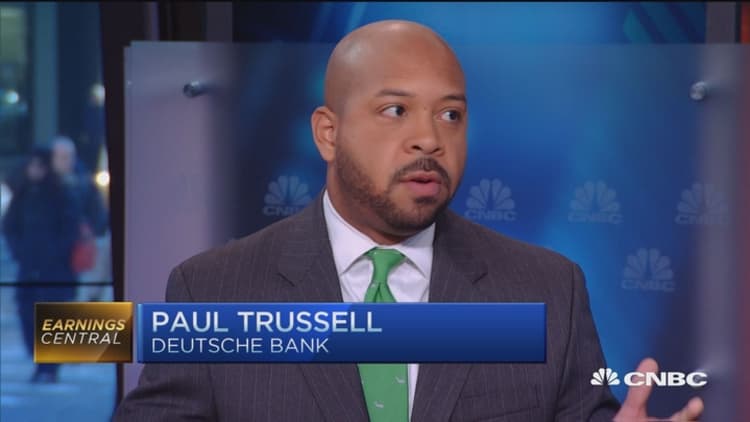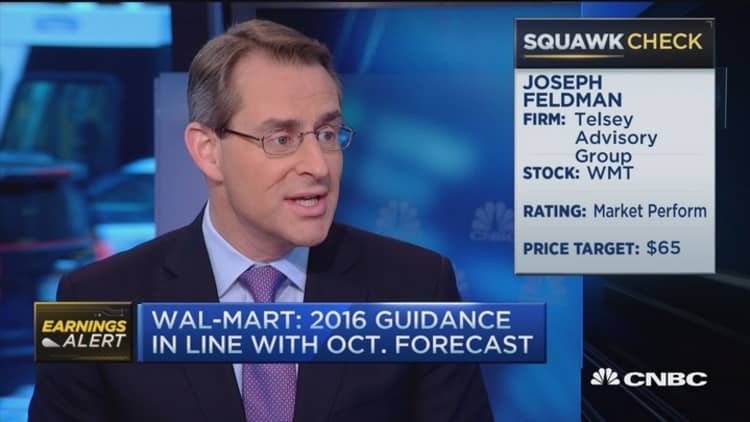


Wal-Mart Stores investors can expect the company to make a comeback, but they will have to be patient, the senior managing director at Telsey Advisory Group said Thursday.
"I think you really have to look out to 2017," Telsey's Joseph Feldman told CNBC's "Squawk Box." "I think they're doing a lot of the right moves now to do the investment spending and cleaning up the stores, more labor hours in the stores, paying people a little bit better, … doing all the things you need to do to have a better infrastructure."
Shares of the retail giant have gained over 5 percent in 2016, but have fallen over 25 percent in the last 12 months. The stock also fell more than 2 percent Thursday after Wal-Mart reported mixed quarterly results.
Wal-Mart reported lower quarterly earnings and cut its sales outlook due to a stronger dollar and recent store closures, sending its shares down nearly 4 percent.
The retailer also raised its 2017 annual dividend by 2 percent to $2 a share.
The retailer posted fourth-quarter earnings per share of $1.49, compared with $1.61 a share in the year-earlier period. Wal-Mart said operating income fell 16 percent from the previous year, to $6.6 billion in the quarter.
Consolidated revenue declined 1.4 percent to $129.7 billion, depressed by the stronger dollar's impact on international operations.
Analysts had expected to report earnings of about $1.46 a share on $130.96 billion in revenue, according to a consensus estimate from Thomson Reuters.
"I think the sales trend actually got a bit worse than people were expecting," Feldman said. "We were looking for about a 1 percent same-store sales number; they came in about half a percent. In the guidance for next year, they talked about flat total sales versus the previous guidance of 3-to-4 percent."
The world's largest retailer said sales at U.S. stores open at least a year rose 0.6 percent in the fourth quarter ended on Jan. 31 from a year earlier. This was their sixth straight quarterly gain, but it missed market expectations for a rise of 1 percent.
For the current quarter, Wal-Mart said it expected a U.S. same-store sales increase of 0.5 percent, a slowdown from the year-earlier rise of 1.1 percent.
The retailer also said it expected net sales to be flat in its new fiscal year, down from a previous forecast for 3 percent to 4 percent growth.
The tepid sales forecast is troubling because it comes despite big investments in workers' wages and sprucing up the stores, Edward Jones analyst Brian Yarbrough said.
"It's the same old story," he said. "They continue to struggle to drive traffic and sales."
The company forecast first-quarter earnings per share of 80 cents to 95 cents, and full-year 2017 EPS of $4 to $4.30.
However, Ken Perkins, equity analyst at Morningstar, said Thursday "these investments take time to pay off, but they're the right moves."
"Out of the brick-and-mortar retailers out there, we feel like Wal-Mart is better positioned to compete against the likes of Amazon over the long term given their scale and given that they have a grocery mix that is better than other brick-and-mortar retailers in the same space."
Wal-Mart's earnings came a month after the company said it will close 269 stores, including 154 in the U.S., this year. The world's largest retailer will also open as many as 405 stores globally, as it shifts its focus toward Supercenters and Neighborhood Markets in profitable locations.
In all, 16,000 employees will be impacted by the store closings, about 10,000 in the U.S.
In another "Squawk Box" interview, Deutsche Bank retail analyst Paul Trussell said: "We were disappointed to see that they closed a lot of their smaller stores. That announcement to us was very disappointing because, as they outlined in their release today, their neighborhood markets comped up 7 percent."
"The consumer is telling Wal-Mart that they do not enjoy shopping in a big-box experience. They do not want to walk 150,000-, 200,000-square-foot stores anymore. They want to shop online, and they want to shop in smaller stores."
Wal-Mart isn't the only retailer to announce a large number of store closings this year. Macy's announced plans last month to shutter 36 stores early this year and Finish Line said that it would close 150 stores by 2020.
Wal-Mart is planning to create hundreds of new management positions over the next three years to bolster the offering of fresh food in its U.S. stores, people familiar with the matter told Reuters.
Wal-Mart has already hired 30 of the new field managers, the people said.
A Wal-Mart spokesman confirmed that it was hiring new managers for fresh food but declined to disclose details.
—CNBC's Krysia Lenzo, Krystina Gustafson, and Reuters contributed to this report.



